Marshalls Preview for 2011
It's that time of year again, and the first of the 2001 brochures and catalogues have started to appear on my desk, but I'll save those reviews until the publications concerned are available to one and all, early in the New Year. However, as a taster of what we can look forward to, Marshalls have provided a "New for 2011" taster booklet.
A succinct 24 pages features nine new products, including flags, jointing, walling and block paving. Some we've seen before from different suppliers or in different formats, but a few of them really are genuinely new to the market.
First of all, a 5-size range of the Indian Black Limestone , which will be offered under the Fairstone® brand. There'll be a 16m² mixed size 'Project Pack' along with a 3-ring circle and optional squaring off kit.
For whatever reason, black stone has been growing in popularity over the last two or three years - maybe it's summat to do with the economic climate? Some of the Chinese black limestones have gained a reputation for being black only until the cheque clears, and they are notorious for fading to a rather sharp steel grey after the first prolonged blast of bright sunshine. The Indian black is not immune, but from the samples I've seen since summer 2009, they do seem to be less affected and weather to a dark grey. I suppose only time will tell what we can expect from this one.
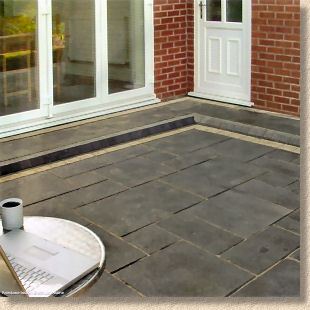
The other new flagstone is a pressed concrete flag that might best be described as a wannabe-Saxon. Just the one size, 450x450x32mm and two colour options (buff and natural) makes this a pretty limited offering.
I'm not sure where this fits. It's certainly more upmarket than plain standard flags, but doesn't have the style, quality or versatility of the genuine Saxon, of which I've never been a huge fan when it comes to patios and driveways. That textured surface is far too attractive to lichens and algae. When new, they look great, but it's one of those pavings that goes very dirty, very quickly and needs near constant cleaning to keep it looking presentable.
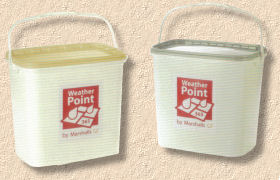
Weatherpoint 365 is Marshalls' attempt to offer an alternative to the very successful resin-based mortars that have been taking more and more market share over the past decade.
I've been a huge supporter of the better resin mortars since they first appeared in Britain and Ireland, and I like to think I've helped develop the market and steer contractors towards the better end of the market. Weatherpoint 365 is, sadly, not one of the 'top of the range' resin mortars, but is a not-too-bad alternative at a more consumer friendly price. I've been privy to some of the umm-ing and ahh-ing that went into Marshalls finding a suitable product and while I understand the commercial implications, I'm a great believer in the adage that you gets what you pays for.
There's no doubt that Weatherpoint 365 is a better product than the current market leader (but then, dried bogies from a snotty-nosed child are better than that crap!) but it's not quite as good as the stuff from NCC/GftK or Romex.
My thoughts of the 'pretend sleeper' Woodstone Planter Kit are not likely to win many friends in that part of West Yorkshire, either! I'm sure it's a good product, and I'm sure there are people out there (retired OCD-impaired accountants and the creatively challenged, etc.) for whom this is an ideal product, but for me, this, and all other attempts to emulate natural timber in wet-case concrete bring to mind just one word: naff!
It's like pink delphiniums: it's just wrong and should never be allowed!
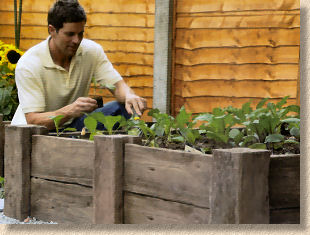
A couple of new walling products follow and while not afflicted with the inherent naffness of the previous new entry, they would not be at the top of my list for potential wall construction materials in the Borlochs Hall garden.
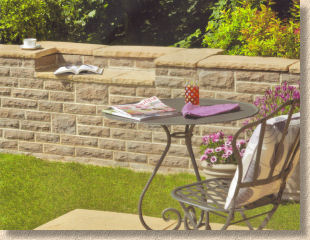
Heritage Weathered Yorkstone walling is an inherently sensible addition to the ever-popular Heritage range. It's an ideal complement to Heritage paving and to much of the brickwork we see in England (less so for the Celtic nations) but I'm spoiled by living in an area where I can get the genuine natural stone for about the same sort of money, and so my views are skewed.
For the majority of folk who have to live in less propitious locations, this is probably a good choice. It's a quality block, nicely modular in 5 sizes (in the 140mm ded depth sizes) and the three tried-and-tested Heritage colour blends.
And much the same can be said for Coach House walling, although its inspiration lies a couple of hundred miles south of that for Heritage above. That might exp[lain why I have more empathy with this block: in it's natural form, it's no something I can pick up for a few quid down the road, and so if I wanted that style in my garden, I'd be much more favourably inclined towards it.
It's a more extensive range, too, offering hogsback and apex coping, and pyramidal pier caps, all in the two West Country inspired colours of Cotswold and Heathland. The more astute among you will recognise this as a kissing-cousin of the much-admired Millstone walling, although the colours are slightly different.
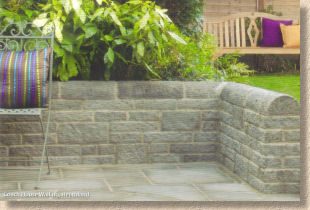
Right: let's get out of the garden and see what's new for driveways. For 2011, Marshalls offer us one of each: a new natural stone paver; a new concrete paver; and a new permeable-greeny-enviro-conscious paving that needs a bit of explaining.
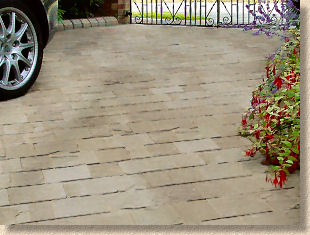
Fairstone® Driveway Setts . I could see this one coming a couple of years ago. It was the one obvious gap in the repertoire. The flags were a runaway success; the walling was beginning to take off; the standard size setts were attracting attention; so all that was left was a modular 3-size 'Tegula' format block that could be laid as simply as a conventional concrete block paver. And here it is! I should have put money on at Paddy Power's!
Three predictable sizes based on the familiar 160mm width with 120, 160 and 240mm lengths, all at a handy 40mm, and in the tewo most popular colour options: Autumn Bronze and Silver Birch.
Obviously, price is an important factor in determining whether a new product is successful or not, but with these, it has to be more a question of how successful.
Perhaps unfairly, I'm less confident of the Drivesett Natrale , the latest addition to the burgeoning Drivesett family. It comes back to my inherent discomfort when concrete tries too hard to mimic natural stone, and claiming a concrete block has a "Split Natural Stone Finish" immediately worries me.
This is a four size modular block, with the three aforementioned 'Tegula' sizes plus a beefy 240x320mm jumper block. There is, of course, the alleged 'split stone' finish and there are two colour options, Sand and Bronze. The colour is actually very good, as there's a variation in tone and shade within individual blocks that's quite fetching.
However, the arrisses look quite pronounced, and the finished appearance is noticeably bumpy. Those relatively deep joints between blocks are the ideal resting place for all kinds of detritus.
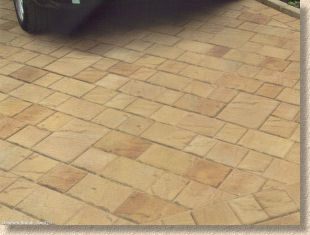
It's too reminiscent of those block pavers we laid in the early 1980s, with their 4-6mm deep arris edges. You can't fail to spot them when you're out and about, as they are the ones with a lush lawn of moss between each block.
Further, that split-look finish is too reminiscent of the Excel block, which never really appealed to me. This one will have to go down as a 'maybe'.
And if I'm not sure about Natrale, I'm really unsure about the Bioverse™ Paving System . It's a sort of permeable paver that comes in 300x300mm modules, so not really a block, more a small element paver, but each block is a whopping 100mm thick, but that's because the surface of the block is formed from 5 or 6 organically shaped 'lumps' with wide gaps between each 'lump; and the whole thing held together by connecting concrete spars at the base of the block.
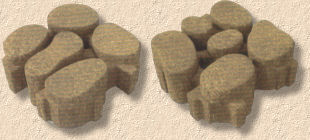
The idea is that these big joints can be filled with a specially selected grass mixture chosen to suit your location within the country and the type of ground you are likely to have. Alternatively, they can be filled with a 6mm or 10mm decorative aggregate. There's your permeability!
At the time of writing, I've not seen any information on construction detail, but I assume it has to go on something akin to the old GrassCrete blocks build-up. No info, either, on edge restraint, but lots of plugs for how it pays for its own carbon footprint in two years and, beyond that, becomes a carbon-gobbling asset to your home.
This might just be a step too far for the notoriously conservative British market. I'd love to think it would take off. It's a neat and clever twist on the grass/ground reinforcement paver systems that have experienced phenomenal growth over the last few years, and I think it looks great in the publicity photies. I've not seen this in the flesh.
It's a product that will challenge many contractors and DIYers, and if it's to be used with grass, I know from spending much of this year looking at ground-reinforcement systems , that it's the quality of rootzone fill and seedmix that can decide whether these installations do indeed look like lush but traffickable surfaces or islands of struggling grass scattered within a quagmire of pretty shitty mud.
If anyone plans on using or installing this product, please give me a shout. I'd love to see how it works and how it survives over its first year or so.
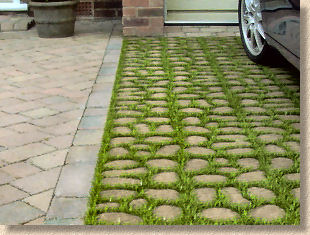
Overall, it's not a bad selection. In any selection of new products, there'll always be things I love and things I'm less keen on, with lots of fair-to-middling in-betweeners, and this forthcoming year doesn't look to be any different. What does cheer me, though, is that there's an element of adventure once again. New ideas are being tried after a couple of season of extreme conservatism, and this suggests renewed cautious optimism in the market, despite the best efforts of bankers and politicians to eff it up.
I look forward to seeing the full brochure once we've got rid of all this damned snow!


